Prostate Biopsy in New Delhi, India
Prostate Biopsy in New Delhi, India
- When to do a Prostate biopsy?
- High PSA treatment options in New Delhi, India
- What’s the Preparation before Prostate Biopsy?
- What is the procedure for Prostate Biopsy?
- What are the complications of Prostate Biopsy?
- When will the report be ready?
- Interpretation of Prostate Biopsy results
- Common misconceptions of Prostate Biopsy

Prostate biopsy
Whenever any of my patient gets the blood test PSA value more than 4 ng/ML, and I tell them that any PSA more than 4 can be a sign of prostate cancer, first thing they say is “Sir, how can I have prostate cancer, I do not have any other symptoms”.
Remember that in the early stages prostate cancer does not cause any symptoms and can be diagnosed only by a high PSA. By the time the symptoms develop the prostate cancer may have already become advanced or metastatic stage 4 Prostate cancer.
So if you are having a high PSA more than 4ng/ml, you should not ignore, it even if there are no other symptoms.
For Any PSA value more than 4ng/ml, a prostate biopsy should always be done.
After doing a prostate biopsy, we will be able to find out if you are suffering from prostate cancer and if yes, then we will also have idea about the grade of the tumour.
I am Dr Ashish Sabharwal urologist, Andrologist and Robotic surgeon from New Delhi India. I did my fellowship training in robotic surgery and prostate cancer treatment from University of Miami, USA and right now I am senior consultant, Urologist and robotic surgeon at Apollo Hospital, New Delhi.
I will give you full information about the prostate biopsy preparation, procedure and precautions.
High PSA treatment options in New Delhi, India
The normal PSA value is 0-4 ng /ml. If your PSA comes more than four ng/ml, you should not ignore it because any PSA more than 4 can be a sign of prostate cancer.
I am Dr Ashish Sabharwal urologist prostate cancer specialist and robotic surgeon in New Delhi India. Read on … I will give you full details about the PSA test and what to do if the PSA report comes high?
What is PSA?
What to do if PSA is more than 4ng/ml?
PSA more than 4 ng/ml can be due to three reasons:
- BPH or prostate enlargement: which is a disease of the old age and it is not cancer.
- Prostate or Urine infection, and
- Prostate cancer
Do not ignore high PSA test! You should understand that, like in females, breast cancer is very common, in men, the most common cancer is prostate cancer.
If you have a high PSA, you should definitely do further testing to make sure there is no cancer.
So if your PSA comes high more than four, the first thing is,you should repeat the PSA in another more reliable lab.
- if in the repeat PSA, the test comes normal then you don’t have to worry about the high PSA previously and you should just follow up with your urologist and do PSAs every three to six months.
- if you do a repeat PSA and it again comes high, the first test is that you have to rule out Urine infection.
You should do a urine routine and a urine culture and make sure there is no infection.
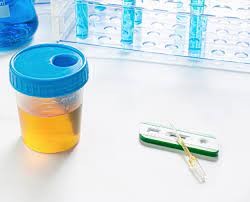
If infection comes in the urine test and your PSA is high, then treat it with antibiotics and then repeat the PSA after one month.
So after urine test, three things can happen:
- The first scenario, you have a high PSA and you have urine infection and you treat the infection and the PSA comes normal: in this case, you don’t have to do anything.
Further just do a repeat PSA every three to six months. - Then another scenario is that the PSA is high and you do a urine test, there is no infection in the urine. in that case, you have to do further testing because this could be a sign of prostate cancer.
- The third scenario is you have done a urine test and the urine test shows infection and you have treated the urine infection and you do a repeat PSA test and still the PSA is high. It has come down from the previous value but still it is high. In this case, again you have to do further testing to make sure there is no prostate cancer.
So now, if you are suspecting that the PSA is high and there is no infection and it could be prostate cancer, the next important tests are:
- Digital Rectal Examination ( DRE ) that is finger examination of the prostate by experienced urologist. The DRE will make us feel if there are any abnormal nodules in the prostate which indicate prostate cancer.
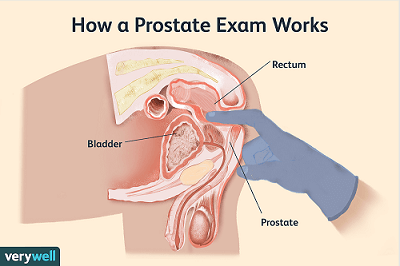
2. Multiparametric MRI of the Prostate. The MRI will show some abnormal areas in the prostate as well as it will tell us about the seminal vesicles, about the lymph nodes and the bone of the pelvis so it will give us the whole picture of the whole pelvis.
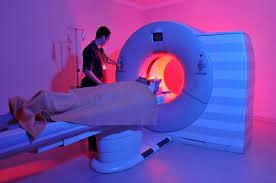
The Prostate Biopsy
Apart from the above tests, an important test to confirm diagnosis of prostate cancer is the Prostate Biopsy.
The prostate biopsy is done by putting a ultrasound probe in the rectum and we take 12 small pieces from the whole prostate and send it for testing and seeing if there is cancer or not it is a simple test done as outpatient and patient can go home the same day and the biopsy reports come in five to seven days.
- Now if after the prostate biopsy report comes that there is no cancer – BIG CONGRATULATIONS! But, you should stay in close contact with your urologist and repeat your PSA every six months to one year to make sure that the PSA is not rising and if the PSA is rising, you might need to do another biopsy.
- If the biopsy shows that there is prostate cancer so we have to do further testing to Stage the cancer.
The first test is a PSMA PET CT scan. In the PSMA PET CT scan, we are able to do the exact staging of the prostate ….is the cancer localized in the prostate or is the cancer going beyond the prostate into the lymph nodes into the seminal vesicles, into the bones, into the other organs.
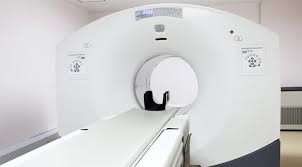
So we know the exact staging of the cancer on PSMA PET CT Scan
Now if the cancer on PET CT is localized or locally Advanced but it is not metastatic, that means it is not going beyond the pelvis so in this, the best treatment is robotic radical prostatectomy with pelvic lymph node dissection.
This is an advanced treatment in which by small holes and 3D Vision magnified Vision we’re able to remove the whole prostate, seminal vesicles, lymph nodes and there is rapid recovery, minimal blood loss and the patient is cancer free because the whole prostate is removed out of the body!
So friends I hope you understood what to do if your PSA is high!
if you are also suffering from high PSA or you are wondering about the prostate biopsy or you want to know the prostate cancer treatment you can contact me now !
Preparation before the Prostate biopsy:
- No UTI: We do a urine routine and culture for the biopsy, we start pre-biopsy oral antibiotics 2 days before the biopsy and also give injectable antibiotics just before the biopsy in hospital. All these prevent a post biopsy infection
- No constipation: We give the patient a laxative, the night before the biopsy so that when he comes for the biopsy to hospital, his bowels are clear. If a patient is suffering from piles or fissure then these have to be treated before doing the Prostate Biopsy because when we put the rectal probe in a patient having a fissure, it will be very painful and he will not allow the prostate biopsy to be done.
- No Blood Thinners: Stop aspirin or blood thinners like clopidogrel for five days before the biopsy.
What is the procedure for Prostate Biopsy?
The prostate biopsy is a simple and safe procedure. The patient should not be afraid of doing a prostate biopsy.
It is a day-care procedure. The patient comes early morning for day-care admission. They can have breakfast before coming to the hospital, they do not need to be empty stomach.
The whole procedure including admission, the prostate biopsy post biopsy rest and discharge takes about four hours.
The Prostate biopsy itself does not take more than 15 minutes.
After shifting the patient to the biopsy room, the patient is positioned in a foetal position.

We placed ultrasound probe into the rectum with patient in foetal position.
It does not pain while passing the probe into the rectum. It is just a pressure feeling as if motion is passing. We always give local anaesthesia before passing the ultrasound probe into the rectum.
We visualise the prostate through the ultrasound probe and then use the prostate biopsy gun to take 12 pieces from the prostate gland.
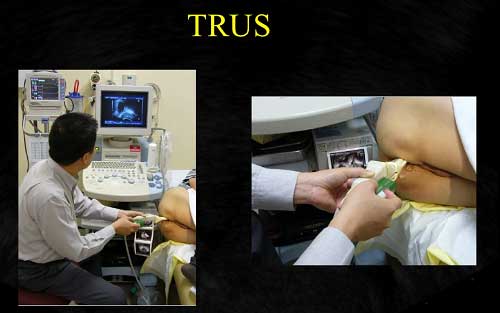
The whole procedure of taking 12 pieces takes about 10 to 15 minutes. After taking the biopsy patient shifted to the ward and once he has passed urine, he can be discharged home.
The biopsy report takes 3 to 5 days to come. After the biopsy report comes we will know if there is cancer or not and if there is cancer what is the stage of the cancer.
Complications of prostate biopsy:
Bleeding:
During the procedure of prostate Biopsy, we pass the needle from the rectum, through the mucosa into the prostrate and take 12 pieces of prostrate. There is repeated poking of the prostate during the procedure. As a result of this, slight blood in the urine, stool or semen is normal.
This light leading gets okay in 3 to 5 days with only high water intake and oral antibiotics. In few instances the bleeding may persist for about 1 month. But do not worry about this.
In rare cases, there can be heavy bleeding associated with clots.
In these cases you have to contact your doctor immediately as you may need to be rushed to emergency department of the hospital for admission and IV antibiotics.
Infection:
During the prostate biopsy the needle passes from the rectum into the prostate so the chance of infection is always there. Mild fever and mild infection is common and easily treated at home with oral antibiotic tablets.
There is severe infection and Post Prostate biopsy sepsis in 2 to 4% cases. This is characterised by high fever more than 102° Fahrenheit with chills and rigours.
Patient suffering this severe infection should immediately contact the doctor and go for admission. They will need to be admitted and IV antibiotics started.
Urinary retention:
Many patients who are having a prostate biopsy already have an enlarged prostate and urinary problems. When we do the prostate biopsy, the prostate gland swells due to the handling of the prostate. In few cases this causes urinary retention or urinary blockage. If the urine stops totally, then we need to pass a Foley catheter to drain the urine. Along with this we give medicines so that the urine pass out opens up and the prostrate swelling reduces. The catheter is removed after 3 to 5 days.
Results of prostate gland biopsy:
Staging and grading of prostate cancer:
| Normal | Means no infection and no cancer |
| Abnormal ( Prostatitis) | Prostate infection |
| Abnormal ( Prostate Cancer) | Adenocarcinoma ( Gleason grading ) |
Prostate Biopsy Common Misconceptions:
- Even if Prostate biopsy is normal, the patient may still be suffering from prostate cancer!
- Prostate biopsy does not cause cancer to spread.
- Prostate biopsy does not cause erectile dysfunction
- Prostate biopsy does not cause a man to be infertile
